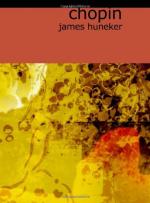Tarnowski relates that Chopin gave his last orders in perfect consciousness. He begged his sister to burn all his inferior compositions. “I owe it to the public,” he said, “and to myself to publish only good things. I kept to this resolution all my life; I wish to keep to it now.” This wish has not been respected. The posthumous publications are for the most part feeble stuff.
Chopin died, October 17, 1849, between three and four in the morning, after having been shrived by the Abbe Jelowicki. His last word, according to Gavard, was “Plus,” on being asked if he suffered. Regarding the touching and slightly melodramatic death bed scene on the day previous, when Delphine Potocka sang Stradella and Mozart—or was it Marcello?—Liszt, Karasowski, and Gutmann disagree.
The following authentic account of the last hours of Chopin appears here for the first time in English, translated by Mr. Hugh Craig. In Liszt’s well-known work on Chopin, second edition, 1879, mention is made of a conversation that he had held with the Abbe Jelowicki respecting Chopin’s death; and in Niecks’ biography of Chopin some sentences from letters by the Abbe are quoted. These letters, written in French, have been translated and published in the “Allgemeine Musik Zeitung,” to which they were given by the Princess Marie Hohenlohe, the daughter of Princess Caroline Sayn Wittgenstein, Liszt’s universal legatee and executor, who died in 1887.
For many years [so runs the document] the life of Chopin was but a breath. His frail, weak body was visibly unfitted for the strength and force of his genius. It was a wonder how in such a weak state, he could live at all, and occasionally act with the greatest energy. His body was almost diaphanous; his eyes were almost shadowed by a cloud from which, from time to time, the lightnings of his glance flashed. Gentle, kind, bubbling with humor, and every way charming, he seemed no longer to belong to earth, while, unfortunately, he had not yet thought of heaven. He had good friends, but many bad friends. These bad friends were his flatterers, that is, his enemies, men and women without principles, or rather with bad principles. Even his unrivalled success, so much more subtle and thus so much more stimulating than that of all other artists, carried the war into his soul and checked the expression of faith and of prayer. The teachings of the fondest, most pious mother became to him a recollection of his childhood’s love. In the place of faith, doubt had stepped in, and only that decency innate in every generous heart hindered him from indulging in sarcasm and mockery over holy things and the consolations of religion.
While he was in this spiritual condition he was attacked by the pulmonary disease that was soon to carry him away from us. The knowledge of this cruel sickness reached me on my return from Rome. With beating heart I hurried to him, to see once more the friend of my youth, whose soul




